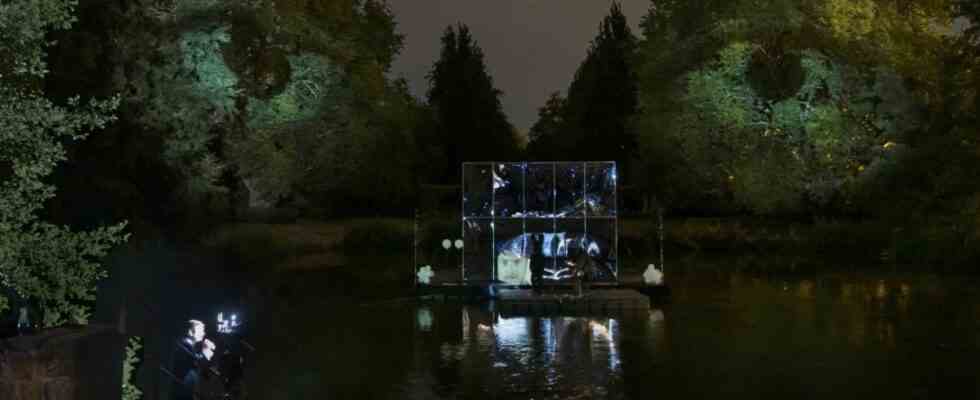The nights in Mülheim an der Ruhr are not really white in the second half of August, and the temperatures in the Raffelberg Park, where the theater is located, can fall well below 20 degrees in the late evening. As if the theater makers wanted to give every conceivable emphasis to the motto of their traditional White Nights, “Retour Natur”, they expose their open-air audience to a natural spectacle without much warning, which makes people with sensitive constitutions fear a cold shock. The lake, or rather the pond, which is so picturesquely situated in the park and forms the backdrop for a performance for the first time, occasionally contributes to cheerfulness, in addition to the evaporative cooling due to its picturesque effects (rowing boats and the like), but hardly to physical well-being. Is this all a foretaste of the upcoming hardcore winter?
So be it: In Philipp Preuss’ production of Henrik Ibsen’s “Woman from the Sea”, the pond becomes the protagonist, the house of the district doctor Doctor Wangel stands on a small lake stage, in whose vicinity the play takes place, and yes: the material is cleverly chosen . Unlike in “Enemy of the People”, for example, ecology is not the main subject here, because that is more the romantic aberrations of Ellida, the doctor’s second wife, but it still plays a marginal role. The lake doesn’t stand for the sea (that’s a bit far away), but for the “Karauschenteich”, where Wangel’s estate is located and from whose pathetic lukewarmness the “Lady from the Sea” believes she is suffering so unspeakably.
Ethereal, unapproachable, unbelievable: Petra von der Beek as Ellida.
(Photo: Franziska Götzen)
At the bottom of her heart, Ellida only wants one thing: to disappear. “Retour nature”, unite with the elements. become coral. Her “love” for a lost sailor, whose return stands in the room like that of a messiah, is an expression of an escape from reality, which a Doctor Wangel with his modest medical knowledge can’t beat. Ellida has not established a relationship with the two stepdaughters, and her marriage is also poor. “Powerful” alone is the enthusiasm for the “stranger”. If the lady from the sea had had the opportunity in her 19th century to absorb the post-humanist writings of Donna Haraway or related natural philosophers, who proclaimed the end of the Anthropocene (and the “Capitolocene”), she would probably have been hooked. So there is a reason why the actor Klaus Herzog, fantastically dressed like the emblem of a coral, presents some of these theories as interludes, so to speak.
How seriously all of this is to be taken is left to the imagination or the empathy of the viewer, who trembles in amusement under his firefly-like, glowing blue headphones. If you look at Preuss’ character direction, which, despite all the politics, does not come off badly, you will find that the comedy predominates. Petra von der Beek skilfully balances her Ellida on the edge of the caricature, an ethereal being, unapproachable, exaggerated, intangible. And Felix Römer’s Doctor Wangel suddenly gets spasms and almost falls into the pond when his Ellida supposedly talks about “divorce”, when she means “decision”, which is basically the same thing.
Philipp Preuss is the crypto-Roberto-Ciulli at the Theater an der Ruhr
In any case, the lake or pond does a great job on this evening, no stage designer, not even Ramallah Aubrecht, could have come up with it better. Ultimately, no one falls into it (that would be slapstick and it’s too cold for that), but the fall into the abyss is, so to speak, in the evening air. The scene in the boat between Wangel’s daughter Bolette (Elzemarieke de Vos) and her old teacher Arnholm (Rupert Seidl), in which he makes her an unabashedly blackmailing marriage proposal, is delicious in its calculated mixture of moonlight romance and chutzpah. Günther Harder’s mysterious “Fremder” has only two appearances, but works excellently in combination with Römer’s Wangel.
Philipp Preuss obviously likes working with a permanent team, which hopefully doesn’t lead to a split in the ensemble. At the Theater an der Ruhr, Preuss has been playing the respectable role of Krypto-Roberto-Ciulli for some time (the eighty-eight-year-old theater founder is retiring a bit), but he doesn’t bear the burden of an artistic director’s job, but rather that of a “member of the management board”. At the same time, he put his own stamp on the more than 40-year-old house, and not just with the Ibsen production.

